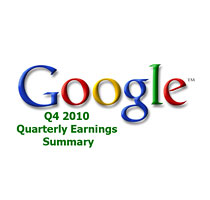 Here’s today’s AdExchanger.com news round-up… Want it by email? Sign-up here.
Here’s today’s AdExchanger.com news round-up… Want it by email? Sign-up here.
Google Reports, Page Becomes CEO
Google reported its Q4 2010 earnings and it was another whopper that exceeded Wall Street analyst expectations as “Google reported revenues of $8.44 billion in the fourth quarter of 2010, representing a 26% increase over fourth quarter 2009 revenues of $6.67 billion.” Oh, and operating income of about $3 billion in Q4. Read the release. But, the biggest news of all was CEO Eric Schmidt stepping aside and becoming Executive Chairman while Larry Page will assume the CEO role on April 4. Read more on the Google blog. And, listen to the earnings call on YouTube.
Ad Networks’ Demise?
In an iMedia Connection post, Jay Friedman doesn’t hold back and discusses the “seven reasons ad networks go out of business.” The main explanation according to Friedman: they all do the same great (or not so great) behavioral targeting, they all have their “proprietary systems.” But what they don’t have: good salespeople to maintain their connections to marketers and publishers. Read more.
Good Behavior Competition
With the online ad industry’s self-policing status under assault from FTC regulators and state and local lawmakers, the competition to offer the “good advertising” seal of approval is heating up. Clickz’s Kate Kaye writes that ad verifier TRUSTe is the latest get certification by the Digital Advertising Alliance certification. The DAA, which oversees the behavioral advertising self-regulatory program, bestows the icon that alerts users that they’re being targeted and allows them to opt-out, has already approved TRUSTe rivals DoubleVerify, and Evidon (formerly Better Advertising). So expect to see more display ads with that DAA icon over the next few months. Read more.
The EU: Self-Regs Rule
Weren’t the Europeans supposed to be the most enthusiastic when it comes to regulation. Well, that’s not the case when it comes to online advertising. Although last fall, the European Union tried to force internet companies to get explicit consent from users before placing tracking cookies on their computers, according to a WSJ piece by John W. Miller, a secret European Commission document written to offer formal guidance to EU member states about how to deal with the targeting issue does not appear to require users’ to “opt-in” to targeting. Now that sounds good, says DaxThink, but the drawback is that the uncertainty about how the use of cookies will eventually be governed continues without a clear resolution. Read more.
Tracking Statement
Here’s where the paranoia about ad tracking can seem justifiable. Lately, some online banking statements have been generating ads based on customers’ debit and credit card activity, Mediapost’s Karlene Lukovitz reports. The ads are in the form of coupons and other discount offers from data-driven ads for McDonald’s, Staples, Macy’s and others. While it seems like the worst time for such ads to present themselves, given the fits advocacy groups and regulators are going through over online ad targeting, the ads are showing some interesting lift, suggesting consumers appreciate the ads (though others would argue that many consumers don’t understand that they’re being monitored by marketers). Read more.
From Digitas To Mediabrands
Liz Ross, formerly Digitas’ chief growth officer, is heading to Interpublic Group’s Mediabrands Ventures as its North American CEO. She will report directly to global CEO Matt Freeman. AdAge’s Michael Bush notes that this is something of a reunion between Freeman and Ross, as they both worked at Tribal DDB way back when. In the new role, Ross is charged with “knitting together” the far flung offerings under Mediabrands, including Velociter, IPG Lab’s Retail Experience Center, Reprise Media and Geomentum. The IPG media buying and digital hub has been putting together an all-star team of media buying vets over the past few months including naming ex-VivaKi exec Tim Hanlon as the head of Velociter (the main investment arm of the Mediabrands family), Sean Finnegan at the top of hyperlocal subsidiary Geomentum and, last week, Universal-McCann chief Matt Seiler as the CEO of the whole group. Read more.
The Special Ops Team
Universal-McCann’s Mitch Weinstein returns to the UM blog with a piece on digital ad operations -a subject he knows well from his day-to-day role. Weinstein advocates for experts on the “ops” team: “Each Ad Ops staffer is responsible for becoming a Subject Matter Expert in an area related to ad serving or targeting technology (known internally as Project SME). For example, Christina has chosen Dynamic Ad Serving as her area of expertise, and David has chosen Video. Some other areas being covered are Mobile, Verification Services, and Data Providers. The list goes on.” Read more.
Bullish On IPOs
A number of analysts and financial market Cassandras have been throwing cold water on the number of planned media IPOs going on the last few months. Not serial investor and entrepreneur Darren Herman. He’s excited about the thought of Facebook, Groupon, LinkedIn, Twitter all doing IPOs (he doesn’t mention companies that are more actively filing, such as content aggregator Demand Media, which has warned potential investors of its risky profitability outlook). He bases his positive views on the increase in the amount of people with Internet access and the growth of online advertising. Looking back at the dotcom boom is also a source of comfort, since today’s digital outfits have much closer ties to established media, as opposed to companies like Lycos, which filed an IPO in 1996, which didn’t have moorings to traditional content or advertising interests and is now little used inside the U.S. Read more.
Bubble Burst
There are two kinds of investors: those who worry about being in the midst of a people and those who rush in headfirst. Jerry Neumann, writing on the blog Reaction Wheel, is a little bit of both. He thinks were in another tech bubble, but he doesn’t necessarily think that’s a bad thing. The trick is, when everyone is throwing money at the next big “innovator,” try to identify something with staying power (easier said than done). Still, the power of bubbles is that they represent “the reckless booming anarchy that create permanent economic growth once the froth blows away. And, especially if you’re an entrepreneur, more people trying to fund you, more people trying to give you below-market rent, more people trying to introduce you to more other people, more talented engineers willing to forgo big-company salaries for the chance to build something meaningful, it’s all good.” Read more.
Shaw Media Taps mDialog
Canada’s Shaw Media is adding more TV programs to its iPad app’s video capabilities and has turned to mobile broadband ad platform mDialog to handle the job, VideoNuze’s Will Richmond reports. Just a month after Shaw released the app, it is now at head of the free chart of the Canadian version of App Store.
Display’s Golden Age
The display market in the UK may lag the U.S., but if a Marketing Week article (it’s part of a special ad supplement) is any indication of how advertisers are adapting to the world of ad exchanges and RTB, then things are looking pretty bright there indeed. “We’re now looking at digital display as an ‘always on’ channel, rather than as [intermittent] campaign activity,” says American Express head of digital acquisition Matthew Turner (now head of online marketing and sales at BSkyB). “We have historically run digital display on a campaign basis, but we’re now at a point where we’ve got such a level of high-quality inventory through exchanges that we’re able to think about display as a way of always building awareness or running direct response, similar to the way in which we treat search.” Read more from the supplement’s ode to ad exchanges here.
Fashionable Retargeting
Meanwhile, retargeting is also becoming more important to the display market in the UK, as retailers such as fashion brands All Saints, Karen Millen and New Look are expected to increase their spending on “reminder” ads that track users who didn’t respond the first, Gina Lovett writes in a cover story for NewMediaAge. In any case, the claims of retargeting providers are pretty staggering. For example, retargeting company Struq said that its offerings had generated conversions of up to 640 percent for its top ten clients, while rival Criteo says over 200 UK advertisers have lined up for its services. Read more












